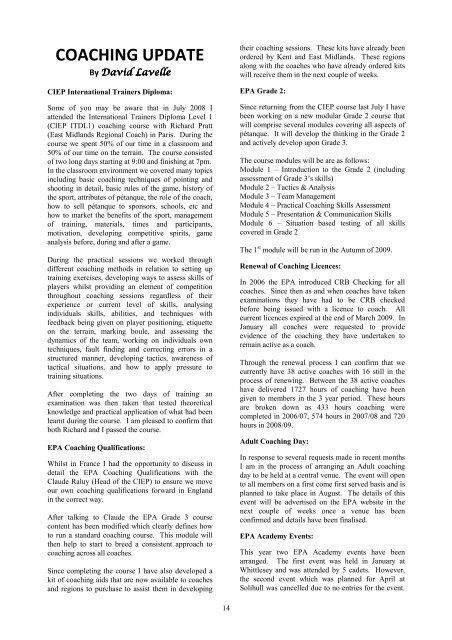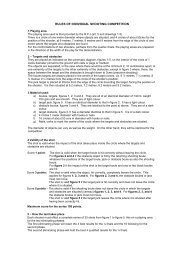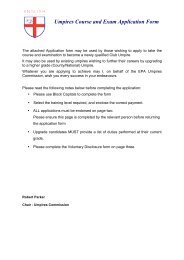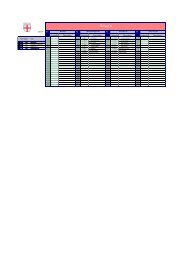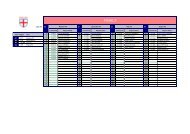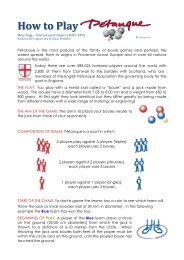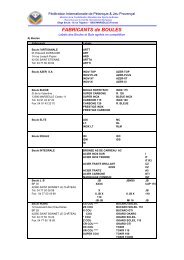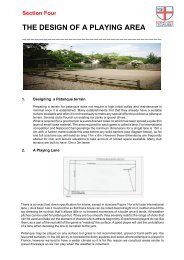Dial up - English Petanque Association
Dial up - English Petanque Association
Dial up - English Petanque Association
Create successful ePaper yourself
Turn your PDF publications into a flip-book with our unique Google optimized e-Paper software.
COACHING UPDATE<br />
By David David Lavelle<br />
Lavelle<br />
CIEP International Trainers Diploma:<br />
Some of you may be aware that in July 2008 I<br />
attended the International Trainers Diploma Level 1<br />
(CIEP ITDL1) coaching course with Richard Pratt<br />
(East Midlands Regional Coach) in Paris. During the<br />
course we spent 50% of our time in a classroom and<br />
50% of our time on the terrain. The course consisted<br />
of two long days starting at 9:00 and finishing at 7pm.<br />
In the classroom environment we covered many topics<br />
including basic coaching techniques of pointing and<br />
shooting in detail, basic rules of the game, history of<br />
the sport, attributes of pétanque, the role of the coach,<br />
how to sell pétanque to sponsors, schools, etc and<br />
how to market the benefits of the sport, management<br />
of training, materials, times and participants,<br />
motivation, developing competitive spirits, game<br />
analysis before, during and after a game.<br />
During the practical sessions we worked through<br />
different coaching methods in relation to setting <strong>up</strong><br />
training exercises, developing ways to assess skills of<br />
players whilst providing an element of competition<br />
throughout coaching sessions regardless of their<br />
experience or current level of skills, analysing<br />
individuals skills, abilities, and techniques with<br />
feedback being given on player positioning, etiquette<br />
on the terrain, marking boule, and assessing the<br />
dynamics of the team, working on individuals own<br />
techniques, fault finding and correcting errors in a<br />
structured manner, developing tactics, awareness of<br />
tactical situations, and how to apply pressure to<br />
training situations.<br />
After completing the two days of training an<br />
examination was then taken that tested theoretical<br />
knowledge and practical application of what had been<br />
learnt during the course. I am pleased to confirm that<br />
both Richard and I passed the course.<br />
EPA Coaching Qualifications:<br />
Whilst in France I had the opportunity to discuss in<br />
detail the EPA Coaching Qualifications with the<br />
Claude Raluy (Head of the CIEP) to ensure we move<br />
our own coaching qualifications forward in England<br />
in the correct way.<br />
After talking to Claude the EPA Grade 3 course<br />
content has been modified which clearly defines how<br />
to run a standard coaching course. This module will<br />
then help to start to breed a consistent approach to<br />
coaching across all coaches.<br />
Since completing the course I have also developed a<br />
kit of coaching aids that are now available to coaches<br />
and regions to purchase to assist them in developing<br />
14<br />
their coaching sessions. These kits have already been<br />
ordered by Kent and East Midlands. These regions<br />
along with the coaches who have already ordered kits<br />
will receive them in the next co<strong>up</strong>le of weeks.<br />
EPA Grade 2:<br />
Since returning from the CIEP course last July I have<br />
been working on a new modular Grade 2 course that<br />
will comprise several modules covering all aspects of<br />
pétanque. It will develop the thinking in the Grade 2<br />
and actively develop <strong>up</strong>on Grade 3.<br />
The course modules will be are as follows:<br />
Module 1 – Introduction to the Grade 2 (including<br />
assessment of Grade 3’s skills)<br />
Module 2 – Tactics & Analysis<br />
Module 3 – Team Management<br />
Module 4 – Practical Coaching Skills Assessment<br />
Module 5 – Presentation & Communication Skills<br />
Module 6 – Situation based testing of all skills<br />
covered in Grade 2<br />
The 1 st module will be run in the Autumn of 2009.<br />
Renewal of Coaching Licences:<br />
In 2006 the EPA introduced CRB Checking for all<br />
coaches. Since then as and when coaches have taken<br />
examinations they have had to be CRB checked<br />
before being issued with a licence to coach. All<br />
current licences expired at the end of March 2009. In<br />
January all coaches were requested to provide<br />
evidence of the coaching they have undertaken to<br />
remain active as a coach.<br />
Through the renewal process I can confirm that we<br />
currently have 38 active coaches with 16 still in the<br />
process of renewing. Between the 38 active coaches<br />
have delivered 1727 hours of coaching have been<br />
given to members in the 3 year period. These hours<br />
are broken down as 433 hours coaching were<br />
completed in 2006/07, 574 hours in 2007/08 and 720<br />
hours in 2008/09.<br />
Adult Coaching Day:<br />
In response to several requests made in recent months<br />
I am in the process of arranging an Adult coaching<br />
day to be held at a central venue. The event will open<br />
to all members on a first come first served basis and is<br />
planned to take place in August. The details of this<br />
event will be advertised on the EPA website in the<br />
next co<strong>up</strong>le of weeks once a venue has been<br />
confirmed and details have been finalised.<br />
EPA Academy Events:<br />
This year two EPA Academy events have been<br />
arranged. The first event was held in January at<br />
Whittlesey and was attended by 5 cadets. However,<br />
the second event which was planned for April at<br />
Solihull was cancelled due to no entries for the event.


